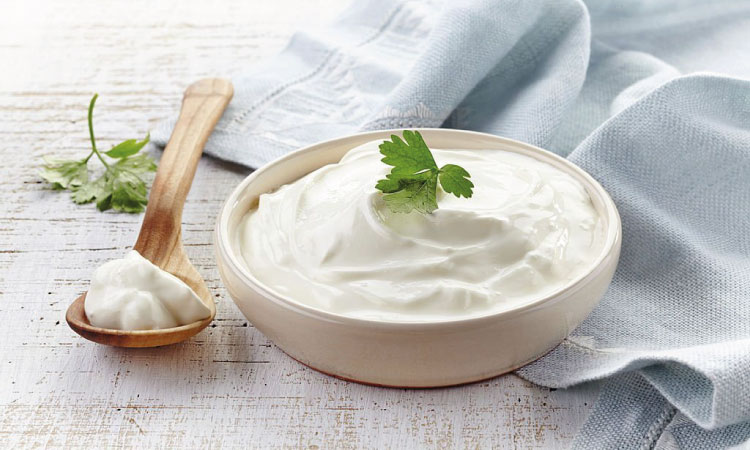An energy-dense diet that is well-balanced and nutrient-dense is vital for pregnant women to ensure a safe pregnancy and to support their unborn child’s growth and development. Pregnancy comes with a variety of cravings, some of which are healthy and some of which are not. This can add a layer of complexity to the situation. Craving sour cream during pregnancy is common. The use of sour cream in place of yogurt is becoming increasingly popular. There’s a sense of vulnerability that comes with pregnancy, especially when it comes to knowing which foods are safe for you and your unborn child. Despite its versatility and wide application, how safe is sour cream during pregnancy?
What Is Sour Cream?
It’s among the most popular dairy products. It goes well with bread and potatoes. Sour cream makes tasty dips and pairs well with roasted or grilled foods like chicken tenders and nachos. It is often used as a garnish for soups and other dishes, and it is typically served with boiled vegetables.
How do you make it? Sour cream is produced by adding lactic acid-producing bacteria to regular milk cream. Some people prefer to make their own sour cream at home rather than purchase it from the store. To do so, they mix heavy whipping cream, an acid such as vinegar or lemon juice, and some milk together.
It has a thick consistency and a flavor that is tangy and tart, making it a very refreshing cream. You can use it to make baked goods softer, or you can add it right before serving a dish that has already been cooked. Sour cream consumption during pregnancy should be approached with caution, no matter how you use it.
Related Reading: Curd And Yogurt During Pregnancy- Benefits, And Precautions
Types Of Sour Creams

Sour cream is a dairy product that comes in a variety of forms, each with a slightly different composition and consistency. It comes in the following variations:
- Standard
- Light
- Fat-Free
In addition, there are sour cream variations from around the globe, such as
- The mild flavor of Mexican Sour Cream
- The classic American sour cream
Nutritional Profile Of Sour Cream
According to a source, 100 grams of sour cream contains
Calculate Due Date With LMP
- Calories: 198 kcal
- Carbohydrate: 4.63 g
- Sugars: 3.41 g
- Fat: 23.3 g
- Protein: 2.44 g
There is a lot of fat and cholesterol in sour cream. There is no fiber in it.
Since sour cream is a fermented food, it is commonly believed to contain probiotics (good bacteria) that promote healthy digestion.
100 grams of sour cream also provides:
- Vitamin A (retinol): 14% DV
- Riboflavin (B2): 13% DV
- Pantothenic acid (B5): 9% DV
- Vitamin B12: 9% DV
- Choline: 3% DV
- Vitamin E: 3% DV
- Vitamin B6: 2% DV
- Folate: 2% DV
- Thiamin (B1): 2% DV
- Niacin (B3): 1% DV
- Vitamin K: 1% DV
The following minerals are present in 100 grams of sour cream:
- Calcium: 8% DV
- Phosphorus: 6% DV
- Selenium: 7% DV
- Potassium: 3% DV
- Magnesium: 2% DV
- Zinc: 3% DV
- Sodium: 1% DV
- Copper: 2% DV
- Manganese: 1% DV
- Iron: 0.4% DV
Is It Safe To Eat Sour Cream During Pregnancy?
It is essential that all dairy products are taken by pregnant women be pasteurized. Therefore, as long as sour cream is made with pasteurized milk, it is fine to consume during pregnancy. This is because the pasteurization procedure eliminates any hazardous microorganisms, whereas unpasteurized foods are common causes of food poisoning during pregnancy.
This may not be the case with homemade sour cream. Raw milk-based homemade sour cream is dangerous for pregnant women to consume. Even when made with pasteurized milk, homemade sour cream is not pasteurized after preparation.
Pregnant women should avoid sour cream that has not been pasteurized because it may contain listeria, a bacterium that can even cause miscarriage or stillbirth in extremely rare cases.
Sour cream can be eaten by pregnant women, but it must be consumed in moderation. The fat content of sour cream is generally high. Despite the fact that sour cream contains a number of essential nutrients like calcium, protein, magnesium, sodium, and phosphorus, its fat content is still too high to make it a healthy choice. Pregnant women who consume excessive amounts of sour cream run the risk of developing serious health problems like gestational diabetes.
The normal growth and development of the fetus are adversely affected if pregnant women consume too much sour food. Even worse, it could lead to cell mutations. All these may lead to abnormalities in the fetus1. During the first trimester, pregnant women should avoid eating foods that are sour. Keep this in mind when you reach for sour cream during pregnancy’s first trimester.
What Is Cultured Sour Cream?
The process of culture imparts a sour flavor to dairy products like milk, butter, and cream. A cultured product will typically be tarter and will also have a lower pH than its uncultured counterpart. If the pH of the sour cream was lower, it would be more acidic and, as a result, sourer.
Cultured sour cream is packed with live cultures, and its high probiotic content may be beneficial to your health2.
A culture of Streptococcus lactis is combined with pasteurized light cream to produce cultured sour cream. The culture produces lactic acid, which solidifies the cream, makes the protein more viscous and imparts a hint of sour flavor. You can consume cultured sour cream during pregnancy if you do not exceed the limit.
Related Reading: Top 10 Food Cravings When Pregnant With A Girl
Health Benefits Of Sour Cream During Pregnancy

Many women crave chipotle sour cream during pregnancy. Light, pasteurized sour cream is safe for pregnant women to consume. Light sour cream is typically low in calories and high in calcium. The combination of these two qualities makes sour cream ideal for pregnant women. Moreover, it is loaded with vitamins and minerals that are highly beneficial during pregnancy.
Pregnancy-friendly benefits of sour cream include:
- The calcium content of sour cream is beneficial to both the mother and the baby. The fetus receives sufficient calcium from the mother’s body. So, pregnant women require a great deal of calcium.
- Phosphorus is the second most abundant mineral in the body, after calcium, and about 85 percent of it is stored in the bones. It is essential for bone and dental health. 7% of the daily value of phosphorus can be found in a half cup of sour cream3
- Sour cream may help with digestion and other common stomach-related issues during pregnancy
- Sour cream is made with milk cream and contains milk proteins. As a result, sour cream proteins have all of the health benefits of milk proteins, as well
- Magnesium, sodium, phosphorus, and vitamin A are all found in sour cream, making it an excellent source of nutrients for expectant mothers
- Due to its fat content, sour cream is frequently used as a salad dressing, which can be beneficial. Salads during pregnancy are more nutritious when prepared with sour cream. Vitamins A and K, which are fat-soluble, can be found in leafy greens commonly used in salads. If you eat these vitamins with a source of fat, they’ll be more easily absorbed. Salads taste better when they are drizzled with a dressing like sour cream.
Risks And Precautions When Consuming Sour Cream During Pregnancy
Sour cream (in moderation) can be part of a healthy and balanced diet for pregnant women. However, if you consume large amounts of sour cream on a daily basis or if you are on a high-fat diet, you should be aware of the following risks
- Salmonella, E. coli, Listeria, and Campylobacter are some of the harmful pathogens found in unpasteurized sour cream, which can cause food poisoning. Premature birth, stillbirth, and miscarriage are all possibilities if a pregnant woman gets food poisoning
- The amount of fat contained in sour cream is relatively high. There’s no denying that fat is an essential part of a healthy pregnancy diet. However, to ensure a healthy pregnancy and avoid complications, pregnant women should maintain a healthy weight gain. While pregnant, being overweight can be dangerous. Sour cream overconsumption has the potential to cause the following:
- Undesirable weight gain
- Gestational diabetes
- Hypertension
- High triglyceride levels
- Birthing difficulties that favor c-section
- Macrosomia, or having a large baby
- Maize starch, calcium sulfate, salt, and sodium phosphate are all common ingredients in some sour creams on the market. These chemicals and stabilizers can have particularly harmful side effects on unborn children.
Precautions
Pregnant women can consume sour cream safely if they adhere to the instructions below.
- If a package is leaking or puffy, it is an indication that it has been contaminated and should be thrown right away
- Sour cream should be refrigerated
- A moldy, rancid smell and yellow or discolored cream are signs of spoilage. In the event that you discover any, dispose of the container
- Use up the sour cream before the “best by” date is printed on the container
- Do not consume sour cream, which has a foul odor and appears too watery
- When not in use, sour cream should be stored in the refrigerator at a temperature that is at or below 40 degrees Fahrenheit (4 degrees Celsius)
- Before consumption, the sour cream should never be allowed to sit out at room temperature for an extended period of time. This makes the possibility of bacterial contamination significantly higher
- Women who are pregnant should select sour cream and other dairy products that are low in fat and sugar
- Always choose pasteurized sour cream brands
- It is best to steer clear of the sour cream served at restaurants because there is a risk that it has not been pasteurized or that it contains unpasteurized additives. Both pose risks to expectant mothers
Conclusion

Because dairy products are such rich sources of protein and calcium, they are an excellent choice for pregnant women to include in a diet that is both healthy and well-balanced. When you go to the store to pick up some sour cream, you should always make it a point to read the label thoroughly and search for the word “pasteurized” on it. It is perfectly safe to consume sour cream in moderation while pregnant, despite the fact that consuming a large amount of it might not be the healthiest option.
FAQs
The amount of fat in sour cream is relatively high. Sour cream consumption should be avoided by pregnant women who are either overweight or trying to restrict their weight.
On the other hand, the occasional consumption of a very small amount of pasteurized low-fat sour cream will not cause any problems.
Pregnant women with a milk or dairy allergy should avoid sour cream in the same way they avoid other dairy products.
One thing that distinguishes yogurt from sour cream is that yogurt is made from fermented milk, whereas sour cream is produced by fermenting dairy cream.
The bacteria that are used to ferment yogurt are not the same as those that are used to ferment sour cream.


